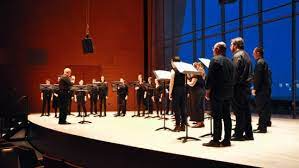BCE: Difference between revisions
From WildWords
Lolafalana (talk | contribs) No edit summary |
Lolafalana (talk | contribs) No edit summary |
||
| Line 22: | Line 22: | ||
=== Etymology === | === Etymology === | ||
Derived from the initials of '''B'''ienen '''C'''ontemporary/ Early Vocal '''E'''nsemble. On the Bienen website, it is also remarked that BCE could be interpreted as "Beyond the Common Era or Before the Common Era"<ref> [https://music.northwestern.edu/academics/ensembles/bce]</ref>, in reference to the musical styles of the repertoire. | Derived from the initials of '''B'''ienen '''C'''ontemporary/ Early Vocal '''E'''nsemble. On the Bienen website, it is also remarked that BCE could be interpreted as "Beyond the Common Era or Before the Common Era"<ref> [https://music.northwestern.edu/academics/ensembles/bce Initials of BCE]</ref>, in reference to the musical styles of the repertoire. | ||
=== Example Sentence === | === Example Sentence === | ||
Revision as of 12:47, 7 June 2021

Do you use "BCE"?
1
0
0
0
There was one vote since the poll was created on 12:10, 7 June 2021.
poll-id 6F4067BA1C1FD401EEBF896DF90042E9
Part of Speech
Noun
Pronunciation
[bi si i:]
['bee / 'see / 'ee]
Description
BCE is an abbreviation for the Bienen Contemporary/ Early Vocal Ensemble. The chamber choir generally consists of 24 voices and performs contemporary and early music. An ensemble for advanced choral singers, the choir is audition-based and contains mostly upperclassmen. BCE is conducted by Donald Nally, who also conducts the Grammy award-winning new music choir The Crossing.
Etymology
Derived from the initials of Bienen Contemporary/ Early Vocal Ensemble. On the Bienen website, it is also remarked that BCE could be interpreted as "Beyond the Common Era or Before the Common Era"[1], in reference to the musical styles of the repertoire.
Example Sentence
I really hope that I get into BCE next year!
